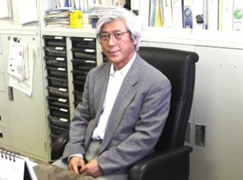National Food Research Institute
Tojiro Tsushida
Born in Hachimantai, Iwate in 1950.
BS from the Faculty of Agriculture, Iwate University.
MS from Iwate University Graduate School of Agriculture. PhD in Agriculture from Nagoya University.
Joined National Tea Research Institute, Ministry of Agriculture, Forestry and Fisheries.
Head, Functional Food Factory Lab , National Food Research Institute, Ministry of Agriculture, Forestry and Fisheries.
Director, Food Function Division, National Food Research Institute.
Director, Food Function Research Center, National Agriculture and Food Research Organization.
Director, Food Function Division , National Food Research Institute.

I was born in Hachimantai, Iwate Prefecture, a small town with a view of Mt. Iwate (also known as “Iwate Fuji”) to the south. Iwate Prefecture was where the writers Kenji Miyazawa and Takuboku Ishikawa came from, but when I was young, I was interested in Hideki Yukawa who was the first Japanese ever to win the Nobel Prize (physics). It was his winning of the Nobel Prize that led me on a path of science. My childhood was like every other kid’s, playing soccer and ping-pong, but I was strongly drawn to physics because I though it would let me do desk research to find theoretical solutions. In time, physics became difficult and my interests turned to the wildlife of the great outdoors. In college, I pursued a specialty in plant biochemistry. At the tea research institute of the Ministry of Agriculture, Forestry and Fisheries where I held my first job, I long researched the relationship between the metabolism and quality of tea components such as L-theanine that gives tea its taste, catechin that gives it its bitterness and caffeine. My work was highly evaluated after I developed a Gyaboran tea that was effective towards lowering blood pressure, by applying the original method that the glutamic acid of fresh tea leaves changes into γ-aimnobutyric acid under anaerobic condition. I do not specialize in rice, which is the theme of this symposium, but I learned that people in Japan, where rice is the main staple, live the longest of anywhere on earth. I think a balanced diet that includes green tea, which keeps blood cholesterol and glucose normal, soy (tofu, etc.) and fish is an important factor behind this. Today, by obtaining certification as a food for specified health use (FOSHU), health benefits that - for example -- control cholesterol and blood sugar level can be indicated on products, advertisements and publications, but it is hard for agricultural products such as fruits, vegetables and grains to obtain a permit and no benchmarks have been established on conveying the effect they have on preventing lifestyle related diseases. This is related to the bigger theme of how agriculture protects the global environment. I am hoping that this symposium provides the opportunity to convey to young people involved in food research how research is a part of the “joy of life” in the way it protects people and is done for people.
| Hobbies: | Soccer, ping-pong, music (singing), thinking about energy issues |
|---|---|
| In Wakayama: | I have never been to Wakayama, so I want explore the castle town. |






